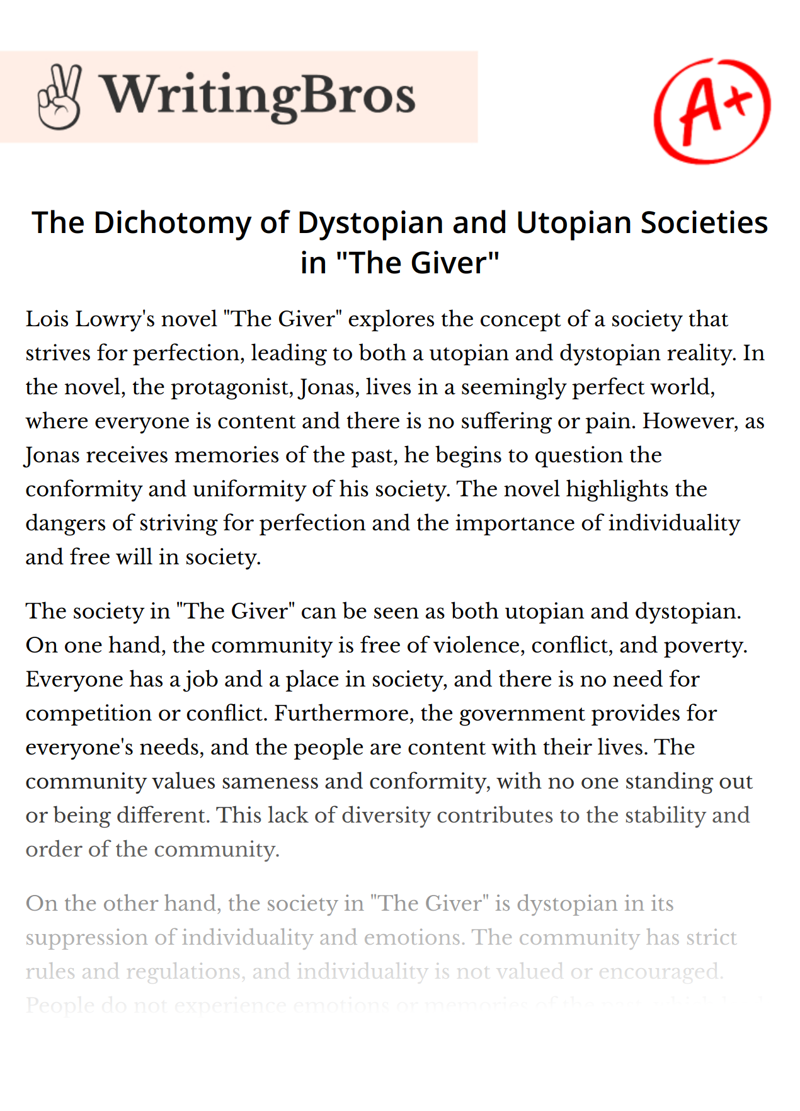The Dichotomy of Dystopian and Utopian Societies in "The Giver"

Lois Lowry's novel "The Giver" explores the concept of a society that strives for perfection, leading to both a utopian and dystopian reality. In the novel, the protagonist, Jonas, lives in a seemingly perfect world, where everyone is content and there is no suffering or pain. However, as Jonas receives memories of the past, he begins to question the conformity and uniformity of his society. The novel highlights the dangers of striving for perfection and the importance of individuality and free will in society.
The society in "The Giver" can be seen as both utopian and dystopian. On one hand, the community is free of violence, conflict, and poverty. Everyone has a job and a place in society, and there is no need for competition or conflict. Furthermore, the government provides for everyone's needs, and the people are content with their lives. The community values sameness and conformity, with no one standing out or being different. This lack of diversity contributes to the stability and order of the community.
On the other hand, the society in "The Giver" is dystopian in its suppression of individuality and emotions. The community has strict rules and regulations, and individuality is not valued or encouraged. People do not experience emotions or memories of the past, which leads to a lack of empathy and compassion. The government controls every aspect of the citizens' lives, and there is no room for creativity or innovation. The people in the community are not free to make their own choices or decisions, and they are not allowed to question the status quo.
The novel emphasizes the importance of individuality and free will in society. Jonas's character represents the human desire for uniqueness and diversity. As Jonas receives memories of the past, he realizes the importance of emotions, love, and pain. These memories allow him to see the world beyond what is provided to him by the government. Jonas begins to question the uniformity and conformity of his society and sees the value in individuality and diversity. The novel shows the dangers of a society that suppresses individuality and emotions, highlighting the importance of free will and self-expression.
The community's obsession with sameness and conformity leads to the suppression of emotions and individuality. The community's control over every aspect of its citizens' lives creates a sense of monotony and boredom, resulting in a lack of creativity and innovation. The community's lack of diversity and individuality also leads to a lack of empathy and compassion, as people are not encouraged to understand or relate to others' experiences. This lack of empathy and understanding leads to a loss of humanity in the community.
In conclusion, "The Giver" by Lois Lowry explores the concept of a society that strives for perfection, leading to both a utopian and dystopian reality. The novel highlights the dangers of striving for perfection and the importance of individuality and free will in society. The society in the novel is both utopian and dystopian, as it provides for every citizen's needs but suppresses individuality and emotions. The novel emphasizes the importance of individuality and free will in society, as these qualities contribute to the creativity, innovation, and compassion that make us human. "The Giver" serves as a reminder of the importance of embracing diversity and individuality in society and the dangers of conformity and uniformity.
Cite this Essay
To export a reference to this article please select a referencing style below

